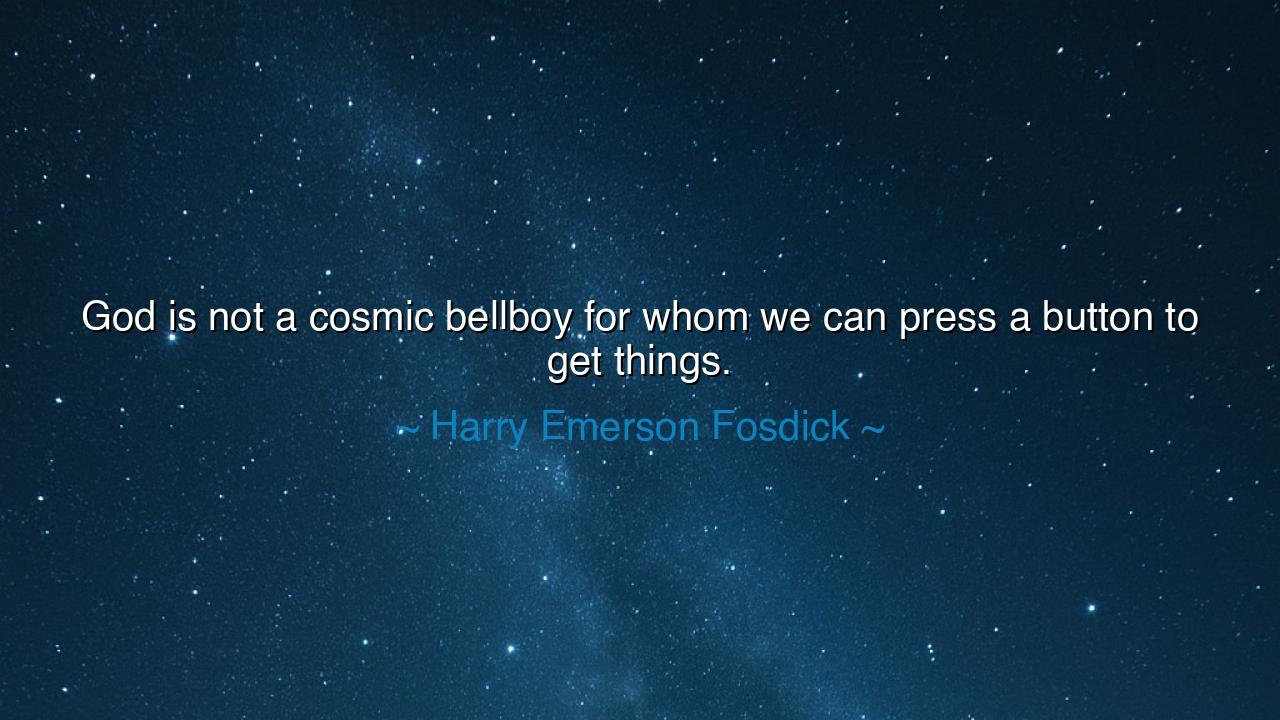
God is not a cosmic bellboy for whom we can press a button to get






Hear, O children of wisdom, the profound words of Harry Emerson Fosdick, who spoke with clarity and conviction: "God is not a cosmic bellboy for whom we can press a button to get things." These words carry with them the weight of a deep and often overlooked truth: God is not our servant, nor is He a tool at our disposal, summoned at our whim to fulfill our desires. In this world where we often seek immediate gratification and solutions, we are reminded by Fosdick that God's nature is far beyond our narrow conceptions of what He should be. He is not a mere servant to our wishes, but the Divine Creator, whose will and purposes transcend our human understanding.
The ancient sages and prophets have long known that to walk with God is not to seek material gain or to demand that He fulfill our selfish desires. In the Book of Isaiah, God declares, "For my thoughts are not your thoughts, neither are your ways my ways" (Isaiah 55:8). God’s purpose is not to grant us every wish or to cater to our fleeting wants, but to guide us on the path of righteousness, wisdom, and growth. His presence in our lives is meant to teach us to seek higher values, to understand eternal truths, and to transform us in ways that may not always be immediately apparent to our limited understanding.
In the ancient myth of King Midas, we see a tale of one who desired the world’s riches without considering the deeper consequences. Midas, granted his wish to turn everything he touched into gold, soon found that his gift was a curse. What he thought would bring him fulfillment—the ability to command material wealth at will—left him isolated and sorrowful. His longing for more turned into a trap, for he did not seek wisdom but only immediate gratification. Midas learned, as do we, that the pursuit of material wealth alone is not the path to fulfillment; it is the higher gifts of wisdom, love, and spiritual growth that bring lasting joy.
Fosdick’s words echo this eternal lesson—God is not a cosmic bellboy, a being who exists to serve our fleeting desires. Rather, He is the Divine Teacher, guiding us toward a greater understanding of life, of love, and of our true purpose in the world. To approach God with the attitude of a consumer, thinking that He exists only to fulfill our desires, is to misunderstand His nature. God does not exist for our convenience, but for our transformation. His love, grace, and wisdom are meant to shape us, to refine us, and to guide us toward a deeper connection with the divine and the eternal.
Consider the story of the apostle Paul, who, though he experienced profound suffering, did not seek to change his circumstances by demanding divine intervention. Instead, he accepted his trials, knowing that they were a part of his spiritual growth. When Paul asked God to remove a "thorn in the flesh", God replied, "My grace is sufficient for you, for my power is made perfect in weakness" (2 Corinthians 12:9). In this answer, Paul learned that the true nature of God’s relationship with us is not to grant us everything we ask for, but to give us the strength and wisdom to endure and grow. God’s purpose is often to shape us through trials, not to simply grant our wishes.
The lesson, then, is profound and clear: God is not at our beck and call. The divine is not here to cater to our every whim, to serve our earthly desires, or to solve all our problems as if we were customers in a cosmic store. Rather, we are called to walk with God, to seek His guidance in all things, and to align ourselves with His will—not to manipulate Him for personal gain. God’s power is not a commodity to be used at will, but a force that works in us and through us to bring about a higher purpose and eternal transformation.
So, what action must we take in our own lives? First, let us recognize that our relationship with God is not transactional. We must seek Him not for the things we can get, but for the divine wisdom and grace He offers. Let us approach prayer not as a means of asking for more, but as a sacred opportunity to listen, to grow, and to deepen our understanding of His will. In our moments of need, let us trust that God will provide—not always in the way we expect, but in the way that is best for our spiritual growth. God’s answers may not always align with our desires, but they will always be guided by His love and wisdom, leading us to a deeper and more meaningful life.
In all things, let us remember that God is not a cosmic bellboy—He is the Creator, the Sustainer, and the Teacher of all. Our role is not to demand, but to listen, to learn, and to grow. We are called not to use God, but to allow ourselves to be used by God for a higher purpose. Let this truth guide our actions, our prayers, and our lives, so that we may walk in alignment with the divine will, trusting that, in the end, God’s wisdom will lead us to a life more fulfilling than we could ever imagine.






AAdministratorAdministrator
Welcome, honored guests. Please leave a comment, we will respond soon